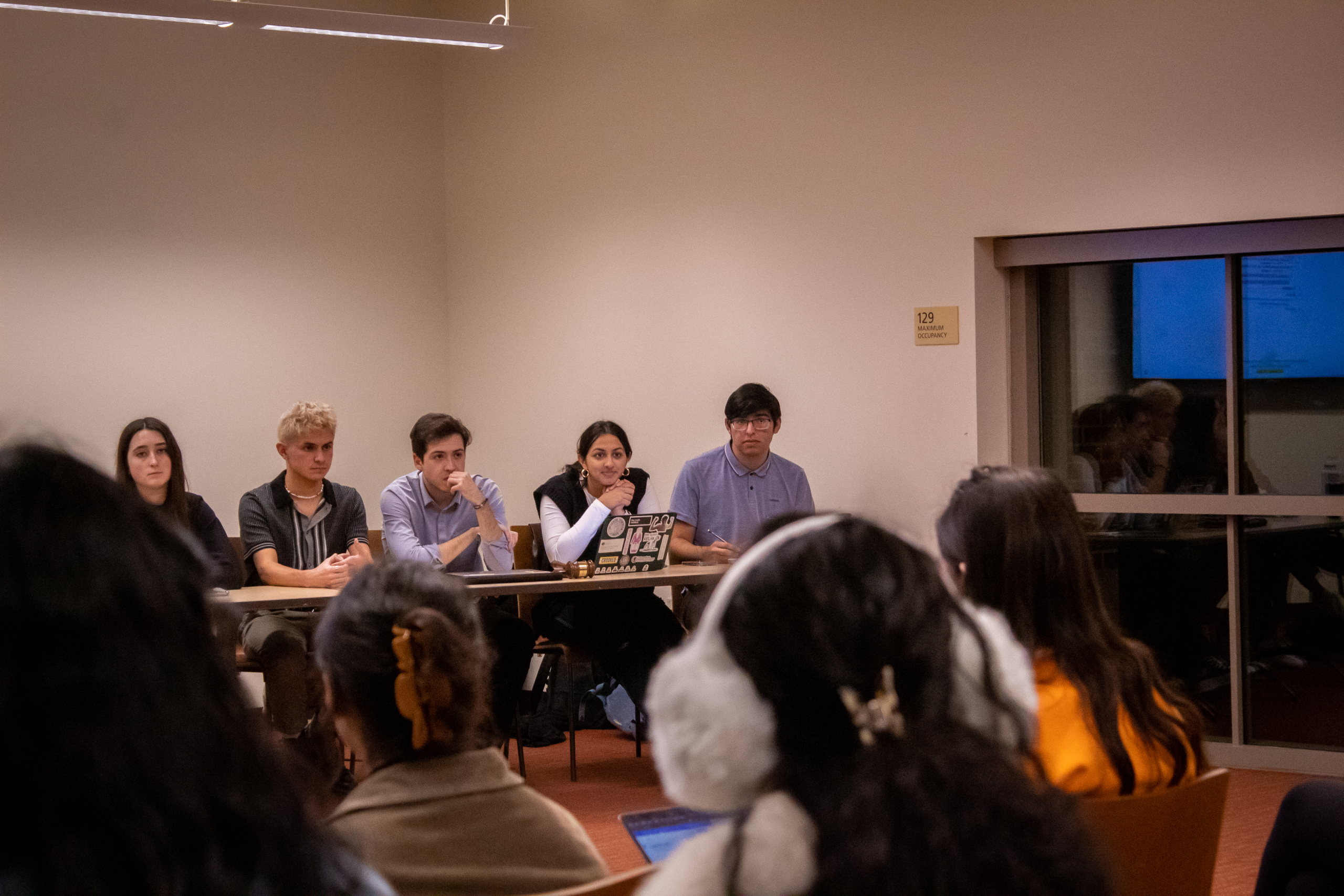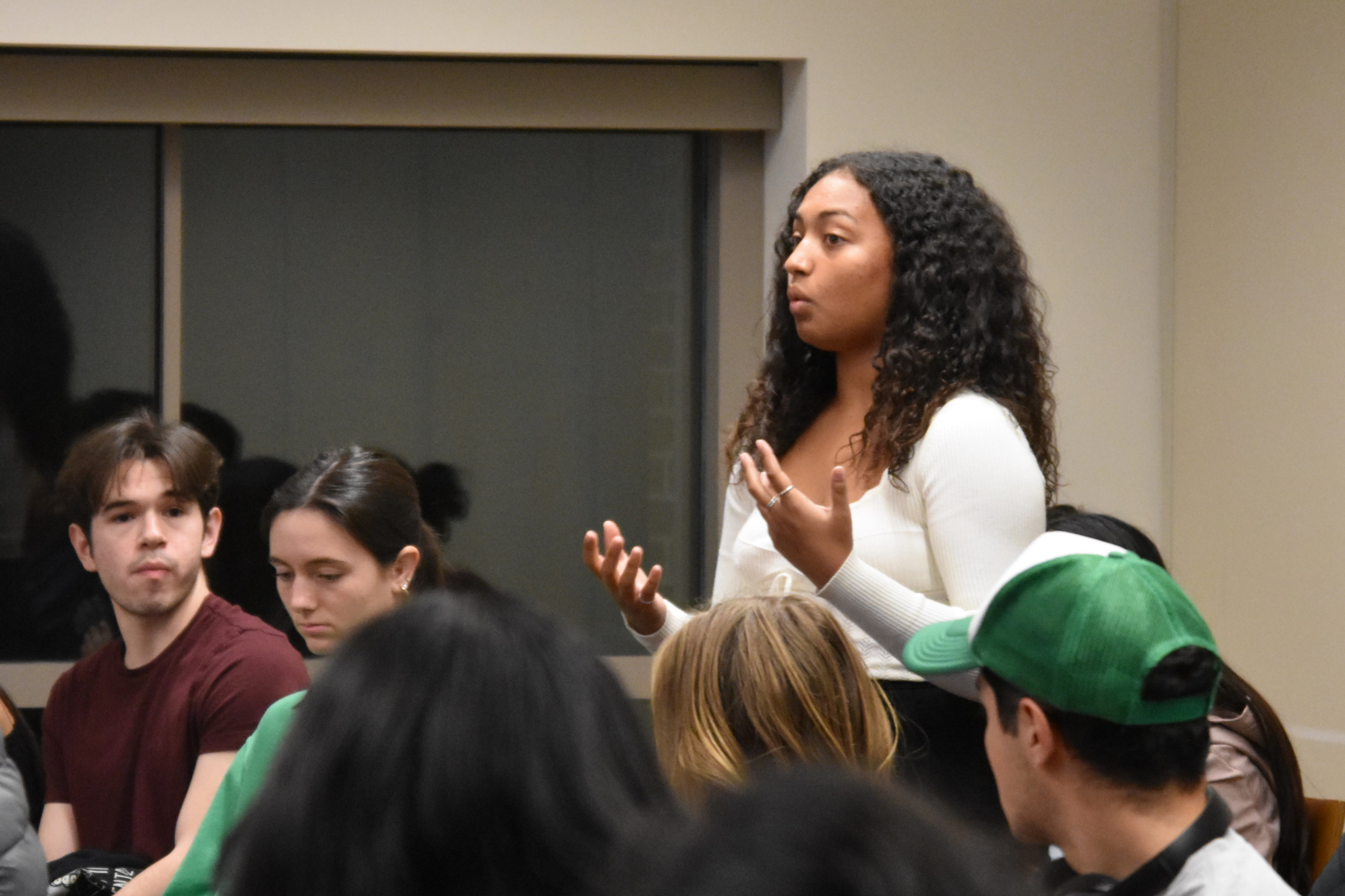USG looks to address funding concerns next academic year
by SASHA RYU, BECCA SPEIER & HANK YANG
Cover art: Gloria Jin | Daily Trojan
As the start of the semester typically brings exciting feelings and recruitment of new members for many Recognized Student Organizations on campus, some organization leaders struggled with receiving the needed funding to support their RSO from the Undergraduate Student Government as a whole this past academic year.
Many RSO leaders have spoken up about their need for increased USG leadership and direction, especially when it comes to USG offering approved funding to RSOs to host organized activities and events for their members.
Leslie Huang, president of Gate Five Chinese Theater, a student-run organization at USC that hosts theatrical plays and screenings in Mandarin and Cantonese, said USG denied her request for an additional $3,000 in funding this semester for venue changes.
Huang questioned why this funding was denied and followed up with USG after the request had been denied. She was met with no response and continued to contact USG until she received a response the day before Thanksgiving break, the timing of which Huang was upset about.
“On the USG guideline that was what was written: They said that all funding inquiries would be responded to within two business days,” Huang said. When Huang confronted USG about it, she was given a different response as to why her funding was denied in the first place.
“I was like, ‘You just keep giving me mixed answers.’ Everyone keeps telling me different things, like, is there any transparency along USG in terms of funding? Because clearly there’s no transparency between USG and the RSO,” Huang said. This wasn’t the first time USG funding for Gate Five Chinese Theater has been “inefficient” and non-transparent, Huang said.
“This is actually the third semester in a row where something has gone wrong with USG funding,” Huang said.
Brian Stowe, USG’s previous chief financial officer, said USG’s funding department is compiling a list of frequently approved vendors for different categories, such as food, event planning and event services. This will make it more transparent for RSOs to see which vendors USG has approved to be funded at events.

“This is actually the third semester in a row where something has gone wrong with USG funding,” said Leslie Huang, president of Gate Five Chinese Theater, a student-run organization at USC that hosts theatrical plays and screenings in Mandarin and Cantonese. (Gina Nguyen | Daily Trojan file photo)
February brought competitive Undergraduate Student Government elections, campaigns and new leadership. Five presidential and vice presidential tickets ran in the 2023 election. Divya Jakatdar and Michelle Lu clinched the presidency and vice presidency, respectively, for the 2023-24 academic year.
President-elect Jakatdar has been on USG in the past and has seen first-hand the issues USG has had when it comes to funding. She acknowledged that there was a negative reaction towards USG for denying the additional funding requests from RSOs on campus. This additional funding can be given to RSOs in addition to the original funding they received from USG, in the case that they need more funding for their organization.
“When we decided to run [for USG leadership], a big thing was that the funding department in USG was going to be kind of a focal point for us over the course of our term,” Jakatdar said. “The backlash that USG has received is definitely fair in a lot of ways. I just think that the whole process is misunderstood on both ends.”
USG claimed in its 2022-23 funding guidelines that it makes the funding approval process as fair as possible by doing so on a first-come, first-serve basis. USG allows RSO funding to range up to $14,000 for each organization.
But additional funding requests are only sometimes approved. USG senators denied Model United Nations’ application for additional funding in early February. USG declared the organization’s application incomplete, which frustrated MUNSC leaders.
MUNSC president Nicole Iwamasa said one of the club’s leaders had gone to USG office hours prior to USG declaring their application incomplete to make sure their applications followed each guideline.
“[USG was] so uncommunicative about it when [the MUNSC representative] went in during office hours and asked them if the application was complete, and they said they had everything they needed, to then hear that the application was incomplete, it to me demonstrated a lack of accountability and transparency from an organization that tries to make that its pillars,” Iwamasa said.
It was very upsetting for MUNSC’s application to be denied after going to the optional and additional USG office hours to ensure their application was complete, after following the specific guidelines USG outlined in their funding application.
“[USG] had never indicated that our application was incomplete prior to that. It seems like an inconsistent application of the requirements,” Iwamasa said. “They were prioritizing other clubs that hadn’t received funding yet, but in their guidelines that they’re supposed to follow because they created them, it says funding is first come, first served.”

Some 20 student assemblies and committees, such as the Black Student Assembly, Queer and Ally Student Assembly and Student Assembly for Gender Empowerment have money set aside for them each year, which usually results in these groups having little difficulty in receiving their requested fund sums. For other organizations, USG also annually allocates $349,000, which tends to be the general and travel fund, that is available to any student or RSO. (Anik Panja | Daily Trojan)
Iwamasa and other MUNSC members said they think USG’s funding guidelines need to be more transparent and standardized. Members of the club’s executive board met with Stowe, to discuss why they were denied funding. However, little change occurred as USG offered no change in their decision.
Some 20 student assemblies and committees, such as the Black Student Assembly, Queer and Ally Student Assembly and Student Assembly for Gender Empowerment have money set aside for them each year, which usually results in these groups having little difficulty in receiving their requested fund sums. For other organizations, USG also annually allocates $349,000, which tends to be the general and travel fund, that is available to any student or RSO.
Asian Pacific American Student Assembly co-executive director Emma Hsu said the assembly received $91,300 as its allotted budget for the 2023 fiscal year. APASA has received the full funding sum that it applied for from USG for the last two years, Hsu said.
APASA’s main expenditures are on events, such as its annual Night Market and speaker series. Per USG’s rules, APASA allocates approximately 10% to 15% of its budget to about 31 member organizations.
Hsu suggested that there should be more of an open discussion and conversation between RSOs and USG.
Khalil Daniels, USG’s newly-elected chief financial officer, said he wants to make a change to the funding application process to address these previous concerns.
“We understand that it has definitely been hard for RSOs to get access to that funding, especially when one organization can submit so many applications at once. I feel like that really just takes the equitable component out of it,” Daniels said. “But our entire goal is just to make sure that more RSOs have more access to the funding instead of just a small group of RSOs getting access to that funding.”
In Fall 2022, the Middle Eastern and North African Student Assembly started its trial semester as an established USG assembly — a status MENASA members had been fighting to achieve “for the past two years.”
Eduard Ghazaryan, MENASA’s advocacy liaison, said USG rejected the assembly’s first two applications because it needed to demonstrate a stronger commitment to programming and advocacy.
“We had to show that advocacy was a huge part of our mission, and that’s the reason that the first attempts [to become a USG assembly] were not established — because there were no advocacy efforts,” Ghazaryan said. “This time, we worked on various projects, such as adding the MENA race category on University forms, adding a cultural-specific MENA therapist in the Engemann [Student Health] Center and just basically representation on campus.”
MENASA received $5,000 in Spring 2023 from USG’s budget of $349,000. MENASA plans to put the money toward its social, professional and cultural events.
Jakatdar said she and Lu asked many RSOs what they’re looking for in USG’s next leaders.
“For the most part, it always comes back to funding because that’s one of the biggest things that USG can do as a support,” Jakatdar said. “And, you know, we were really excited to take that input and kind of digest that, and that’s kind of informing the way that we’re thinking about this.”
Jakatdar, Lu and Daniels have promised greater inclusivity and intentional representation for everyone in the USC student body, focusing on advocacy within RSOs. One way they plan to do this is by focusing on how RSOs will be using their funding to make events more inclusive for the entire USC community.
“Something new that we’re currently working on right now is trying to see how programming assemblies are going to use our funding,” Daniels said. “We’re really trying to focus more on advocacy with the organization, so making sure that they’re not only doing program events, but also advocating for the communities that they’re serving.”




